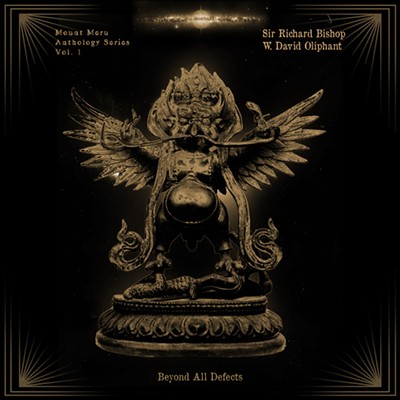Founded in 1981, the fearlessly experimental band was named for the infamous Phoenix-area retirement community, not the South African vacation destination. After a year or so, its shifting personnel settled on the trio that would last for 25 years: bassist Alan Bishop, guitarist Richard Bishop and percussionist Charles Gocher, who was also a filmmaker.
The Sun City Girls came to an end in February 2007, with Gocher's death after a long battle with cancer.
"As we have said for a long time, if anyone dies or leaves, the group is done," said Alan Bishop in an e-mail interview last week.
But the Bishops couldn't let the music die completely.
In addition to reissuing archival recordings on their Abduction Records label, the brothers have been on the road for more than a month with the tour The Brothers Unconnected: A Tribute to Charles Gocher and Sun City Girls. The show will visit Club Congress on Saturday night, July 5.
In addition to two acoustic sets of Sun City Girls songs, the performance will feature The Handsome Stranger, a 40-minute collection of Gocher's avant-garde video works, which were described in a press release as "equal parts demented, brilliant, hilarious and inventive."
Over the years, Sun City Girls have shown themselves adept at Middle Eastern, South Asian, African and South American music, as well as beat poetry, trippy surf rock, Western twang, rural blues and folk, sea chanteys, old-timey murder ballads and free-jazz-style improvisation--a mad ethno-fusion of the Ventures, Sandy Bull, proto-psychedelic music and Captain Beefheart and His Magic Band.
One might notice from that list that the band pretty much has avoided anything resembling mainstream pop or rock music.
"Perhaps this is true, to a degree," Bishop noted, "but I let others dissect and analyze the specifics of the genres, styles, etc. I'm too close to it all to care. It's all folk music to me, anyway."
He was, however, quick to dismiss praise for his band's abilities and adventurous range, opining instead that all musicians should be as diverse.
"We can do it, yes. So can many others, perhaps anyone. But they are taught to fail and to never evolve and to act like lemming fucking sheep losers by their masters. We have many interests and aren't one-dimensional. What's so revolutionary or amazing about that? If that is amazing, most musicians/bands are a failure. But I already knew that, so let's just say that most musicians and bands are lame-ass one-dimensional loser fucks who know nothing beyond their immediate surroundings. ... Yeah, that's how it is."
Even the most dedicated Sun City Girls fans might have found it hard to keep up with the sheer volume of the band's music-making over the years, and much of its recorded output is quite rare or out of print.
During its history, Sun City Girls made some 50 albums, 30 cassette-only releases and 15 7-inch singles, Bishop estimated. "And 500 unreleased LPs you have never heard," he added.
Initial small pressings of their albums and subsequent high demand have caused the market for original Sun City Girls records to rival that of crude oil. An LP version of the seminal Grotto of Miracles (1986) recently sold for $76 on eBay, and out-of-print CD versions of the band's albums are priced preciously as well. While you can pick up Valentines From Matahari for as little as a tank of gas ($43), the 1990 masterpiece Torch of the Mystics is priced from $75 to $96 on Amazon.com.
Bishop is not unaware of this phenomenon, about which he says, "I have no problem with free enterprise and collectable commodities markets."
But he and his brother work hard to reissue as many of their recordings as they can through Abduction's archival series, despite the fact that they don't sell anywhere near gold-record status.
"There has never been a great demand for our records anywhere and at any time. We are still very small-time and obscure when it comes to popularity, sales, etc., and that's best for us personally. We'll continue to release records."
Two new releases, for instance, will be available at the live shows on the current tour. They'll be selling a new limited-edition LP of Sun City Girls live stuff and a Brothers Unconnected tour CD featuring the Bishops' acoustic versions of tunes from throughout the Girls' career.
Of special interest to indie rock and film fans, Drag City Records recently released the soundtrack album for the Harmony Korine movie Mister Lonely, which features eight new Sun City Girls tracks and a score the Girls co-composed with J. Spaceman (Jason Pierce) of Spiritualized.
Not to worry, guitar buffs: Richard Bishop continues to record and release solo albums under the performing name Sir Richard Bishop. His solo catalog includes such acclaimed albums as Salvador Kali, While My Guitar Violently Bleeds and last year's Polytheistic Fragments, which critics have compared to such experimental folk masters as John Fahey and Robbie Basho.
In the early 1990s, the members of Sun City Girls moved to the Seattle area, where the brothers remain.
Bishop admitted missing several things about Arizona and the desert in particular: "The desert rain and the scent of creosote, orange blossoms, palm trees, cactus, peyote and Bufo alvarius."
For those of us not scientifically inclined, Bufo alvarius also is called the Colorado River toad and is found only in the American Southwest. It's probably best known by some humans for its venom, which when ingested is alleged to deliver an intense hallucinogenic experience. Biology class dismissed.








